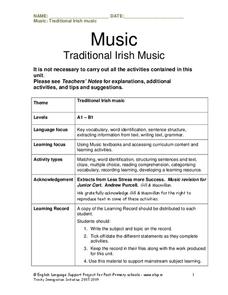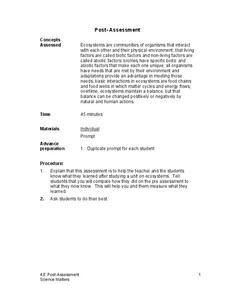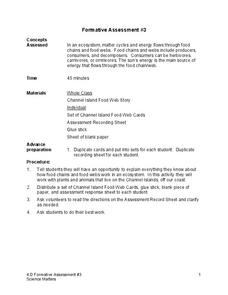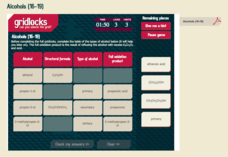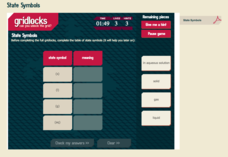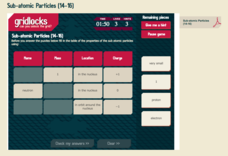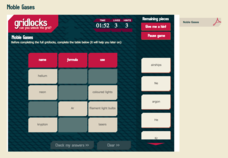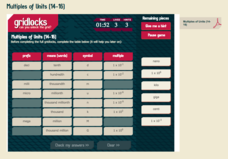K12 Reader
Change the Adjectives to Nouns
Adjectives are supposed to describe nouns, but they can actually become nouns themselves! Learners review ten adjectives and transform them into the nouns found in their roots.
K12 Reader
Comparatives and Superlatives: Halloween Edition
What's the spookiest thing about Halloween? Which haunted house is ghostlier than the others? A list of Halloween-related adjectives await your elementary learners, along with columns to write the comparative and superlative forms of each.
English Language Support Programme
Traditional Irish Music
Celebrate sean-nós, céilí, and the lilting music of the Emerald Isle with a set of language arts activities! Learners complete word puzzles, vocabulary exercises, and comprehension questions about traditional Irish music.
Science Matters
Post-Assessment
Twenty questions make up an assessment designed to test super scientists' knowledge of ecosystems. Scholars answer multiple-choice and short-answer questions about organisms, food chains, energy flow, and more.
Science Matters
That’s An Otter Story
Young scientists discover how sea otters' habitats have changed due to human impact. Through conversation, video observation, and story reading, scholars identify how human interactions change a specific ecosystem in both positive and...
Science Matters
Formative Assessment #3
Thirteen short-answer questions follow a brief food web activity in a formative assessment designed to test knowledge of ecosystems and the energy that flows through them.
Science Matters
Formative Assessment #1
Discover how much your young scientists know about biotic and abiotic factors with a two-question formative assessment that requires them to observe, list, and describe.
Science Matters
Ecosystem Pre-Assessment
Test scholars' knowledge of ecosystems with a 20-question pre-assessment. Assessment challenges learners to answer multiple choice questions, read diagrams, and complete charts.
Classics for Kids
Instrumental Sounds
What sound does a piccolo make? What's the difference between a violin and viola? What family does a timpani belong to? Take a tour through the different sections of an orchestra with an interactive reference tool.
Prestwick House
Ten Days to A+ Grammar: Verbs
What are you doing today? What have you done this week? What will you be doing next month? Focus on verb usage with a series of fill-in-the-black exercises on basic tenses, inappropriate shifts in tense, and active and passive voice.
K12 Reader
Circle It! Indirect Objects
If you give this worksheet to your class, make sure you know where the indirect object is! Young grammarians work on their grammar skills with a series of ten sentences, each with an indirect object ready for pupils to circle.
Hookshot Creative
Compose Your Own Music
Channel the masters with an interactive music composition activity! Learners use the online tool to create their own masterpieces one measure at a time.
Curated OER
Which Number Should I Call?
Who do you call if you spot someone littering? What if you see a fire? Who should you contact if the garbage truck does not arrive? Find out with a 13-question worksheet equipped with scenarios for scholars to read and decide which of...
Royal Society of Chemistry
Alcohols (16-19)
Propanol is a common alcohol used in hand sanitizers. The many forms and uses of alcohols fill an intriguing lesson. Scholars apply logic to match alcohols, chemical structural formulas, oxidation products, and more in a series of puzzles.
Royal Society of Chemistry
Types of Bonding
A covalent bond yells at an ionic bond, "Didn't anyone teach you to share?" Four matching puzzles allow pupils to review covalent, ionic, and metallic bonding. They apply logic and problem solving to complete gridlocks including the...
Royal Society of Chemistry
The Blast Furnace
The largest chemical reactors are blast furnaces, used to make iron from ore. Scholars explore reactants by first matching each one to its purpose and formula. Then, a series of three gridlock puzzles reinforce the content while...
Royal Society of Chemistry
Tests for Anions
The anode, the positive electrode, attracts negative charges, which is why we call negatively charged atoms anions. The interactive allows pupils to match six different anions to the associated properties when testing. Offering four...
Royal Society of Chemistry
State Symbols
When water is a solvent in a chemical equation, we consider it an aqueous solution. Scholars match the name of four states of matter to their proper symbol in a chemical equation. Four puzzles provide repetition to help pupils remember...
Royal Society of Chemistry
Sub-Atomic Particles (14-16)
In 1897, J.J. Thomson discovered the electron, the first subatomic particle proven to exist. Scholars review their understanding of electrons, protons, and neutrons as they work through the puzzles. Each puzzle connects two or three...
Royal Society of Chemistry
Pollutants in Air (14-16)
Polluted air contains more than 200 chemicals that age the skin, causing urban women to appear 10 percent older than their rural peers. An interesting interactive connects air pollutants and related data. Scholars work their way through...
Royal Society of Chemistry
Noble Gases
It is best to avoid jokes about noble gases; they get no reaction. Scholars match the noble gases to their symbols and uses. Then they solve three gridlock puzzles reviewing the material while applying some simple logic.
Royal Society of Chemistry
Multiples of Units (14-16)
Most mnemonics for remembering the metric system only include seven words. Scholars need to know a few more to complete the included puzzles. They match the prefix to the meaning, symbol, and multiple in a series of four increasingly...
Royal Society of Chemistry
Ionic Formulae 1
The ionic formula for banana would be BaNa2. Scholars work their way through four puzzles reviewing ionic formulas. Each puzzle requires scientific knowledge as well as logic and problem-solving skills.
Royal Society of Chemistry
Flame Test Colours
Scientists identify elements by the color of flame they produce because each element is defined by exactly one line on the emission spectrum. By completing a series of puzzles, scholars reinforce their knowledge of the results of flame...




